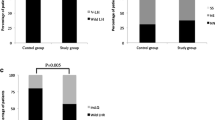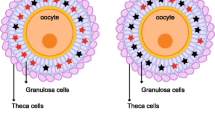Abstract
Objectives
The purpose of this study was to evaluate the influence of the follicle-stimulating hormone (FSH) receptor poymorphisms Asn680Ser and Thr307Ala on endometriosis in Turkish women.
Methods
Polymorphic analysis of the FSH receptor gene was performed in 100 patients with endometriosis and 100 controls. Genomic DNA was obtained from peripheral blood leukocytes and polymorphisms were investigated using restriction fragment length polymorphism analysis.
Results
There were no significant differences in genotype frequencies of FSH receptor gene between endometriosis patients and controls. When the patients were divided into two groups according to disease severity, we found that the patients with the SS (680 Ser/Ser) or AA (307 Ala/Ala) genotype were less likely to develop stage 3–4 endometriosis compared to the stage 1–2 endometriosis group (P = 0.004; OR: 0.177, 95 % CI 0.055–0.568 and P = 0.040; OR: 0.240, 95 % CI 0.061–0.938; respectively).
Conclusions
The distributions of FSHR polymorphisms may not have an effect on endometriosis development but they are associated with the severity of the disease. The polymorphisms encoding SS at the position 680 and AA at the position 307 and the patients with the genotype that included alanine or serine were less likely to develop stage 3–4 endometriosis compared to the stage 1–2 endometriosis group.


Similar content being viewed by others
References
Eskenazi B, Warner M (1997) Epidemiology of endometriosis. Obstet Gynecol Clin North Am 24:235–258
Simpson JL, Bischoff FZ, Kamat A, Buster JE, Carson SA (2003) Genetics of endometriosis. Obstet Gynecol Clin North Am 30:21–40
Tempfer CB, Simoni M, Destenaves B, Fauser BC (2009) Functional genetic polymorphisms and female reproductive disorders: Part II-endometriosis. Hum Reprod Update 15:97–118
Wang HS, Wu HM, Cheng BH, Yen CF, Chang PY, Chao A, Lee YS, Huang HD, Wang TH (2012) Functional analyses of endometriosis-related polymorphisms in the estrogen synthesis and metabolism-related genes. PLoS One 7:e47374
Lessey BA, Metzger DA, Haney AF, McCarty KS Jr (1989) Immunohistochemical analysis of estrogen and progesterone receptors in endometriosis: comparison with normal endometrium during the menstrual cycle and the effect of medical therapy. Fertil Steril 51:409–415
Meduri G, Bachelot A, Cocca MP, Vasseur C, Rodien P, Kuttenn F, Touraine P, Misrahi M (2008) Molecular pathology of the FSH receptor: New insights into FSH physiology. Mol Cellular Endocrinol 282:130–142
Kossowska-Tomaszczuk K, De Geyter C, De Geyter M, Martin I, Holzgreve W, Scherberich A, Zhang H (2009) The multipotency of luteinizing granulosa cells collected from mature ovarian follicles. Stem Cells 27:210–219
Danilovich N, Roy I, Sairam MR (2002) Emergence of uterine pathology during accelerated biological aging in FSH receptor-haploin sufficient mice. Endocrinology 143:3618–3627
Kumar TR (2005) What have we learned about gonadotropin function from gonadotropin subunit and receptor knockout mice? Reproduction 130:293–302
Lussiana C, Guani B, Mari C, Restagno G, Massobrio M, Revelli A (2008) Mutations and polymorphisms of the FSH receptor (FSHR) gene. Clinical implications in female fecundity and molecular biology of FSHR protein and gene. Obstet Gynecol Surv 12:785–795
Wang HS, Cheng BH, Wu HM, Yen CF, Liu CT, Chao A, Wang TH (2011) A mutant single nucleotide polymorphism of follicle-stimulating hormone receptor is associated with a lower risk of endometriosis. Fertil Steril 95:455–457
Gromoll J, Simoni M (2005) Genetic complexity of FSH receptor function. Trends Endocrinol Metab 16:368–373
González-Fernández R, Peña Ó, Hernández J, Martín-Vasallo P, Palumbo A, Ávila J (2011) Patients with endometriosis and patients with poor ovarian reserve have abnormal follicle-stimulating hormone receptor signaling pathways. Fertil Steril 95:2373–2378
Sudo S, Kudo M, Si Wada, Sato O, Hsueh AJ, Fujimoto S (2002) Genetic and functional analyses of polymorphisms in the human FSH receptor gene. Mol Hum Reprod 8:893–899
Falconer H, D’Hooghe T, Fried G (2007) Endometriosis and genetic polymorphisms. Obstet Gynecol Surv 62:616–628
Tempfer CB, Simoni M, Destenaves B, Fauser BC (2009) Functional genetic polymorphisms and female reproductive disorders: part II–endometriosis. Hum Reprod Update 15:97–118
Vietri MT, Cioffi M, Sessa M, Simeone S, Bontempo P, Trabuco E, Ardovino M, Colacurci N, Molinari AM, Cobellis L (2009) CYP17 and CYP19 gene polymorphisms in women affected with endometriosis. Fertil Steril 92(5):1532–1535
Falconer H, Andersson E, Aanesen A, Fried G (2005) Follicle-stimulating hormone receptor polymorphisms in a population of infertile women. Acta Obstet Gynecol Scand 84:806–811
de Koning CH, Benjamins T, Harms P, Homburg R, van Montfrans JM, Gromoll J, Simoni M, Lambalk CB (2006) The distribution of FSH receptor isoforms is related to basal FSH levels in subfertile women with normal menstrual cycles. Hum Reprod 21:443–446
Wu XQ, Xu SM, Liu JF, Bi XY, Wu YX, Liu J (2014) Association between FSHR polymorphisms and polycystic ovary syndrome among Chinese women in north China. J Assist Reprod Genet 31:371–377
Unsal T, Konac E, Yesilkaya E, Yilmaz A, Bideci A, Ilke Onen H, Cinaz P, Menevse A (2009) Genetic polymorphisms of FSHR, CYP17, CYP1A1, CAPN10, INSR, SERPINE1 genes in adolescent girls with polycystic ovary syndrome. J Assist Reprod Genet 26:205–216
Greb RR, Grieshaber K, Gromoll J, Sonntag B, Nieschlag E, Kiesel L, Simoni M (2005) A common single nucleotide polymorphism in exon 10 of the human follicle stimulating hormone receptor is a major determinant of length and hormonal dynamics of the menstrual cycle. J Clin Endocrinol Metab 90:4866–4872
Simoni M, Nieschlag E, Gromoll J (2002) Isoforms and single nucleotide polymorphisms of the FSH receptor gene: implications for human reproduction. Hum Reprod Update 8:413–421
Acknowledgments
This study was supported by Selcuk University Scientific Projects fund.
Conflict of interest
The authors declare that they have no conflict of interest.
Author information
Authors and Affiliations
Corresponding author
Rights and permissions
About this article
Cite this article
Kerimoglu, O.S., Yılmaz, S.A., Pekin, A. et al. Follicle-stimulating hormone receptor gene polymorphisms in women with endometriosis. Arch Gynecol Obstet 291, 1411–1416 (2015). https://doi.org/10.1007/s00404-014-3562-4
Received:
Accepted:
Published:
Issue Date:
DOI: https://doi.org/10.1007/s00404-014-3562-4




